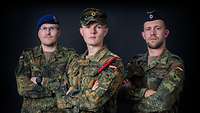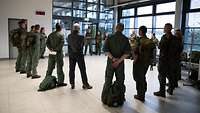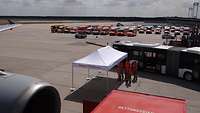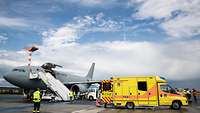Boundary experience: Medical evacuation for Ukraine
Boundary experience: Medical evacuation for Ukraine
- Date:
- Place:
- Germany
- Reading time:
- 6 MIN
In early summer 2022, the Bundeswehr regularly medevaced war-wounded Ukrainians to Germany – almost all were seriously wounded, many traumatised. Three soldiers from 2 Medical Regiment in Koblenz participated in these strategic aeromedical evacuation (stratAE) flights. The work on board, but especially the pictures of injured children and teenagers they saw on these flights, have changed them – but also reassured them with regard to their choice of profession.
On a sunny afternoon, Chief Petty Officer Nico R., Master Sergeant Christoph A. and Master Sergeant Patrick G. are sitting under a pavilion at Falckenstein Barracks in Koblenz. They talk about their memories of the flights by which the Bundeswehr has medevaced a total of 277 Ukrainians to Germany so far. All three are trained independent medics, each of them has participated in two stratAE flights so far. "When you arrive at the airport, there are dozens of ambulances. And in each of them there are two, sometimes even three patients waiting to be taken to the aircraft. During training in Germany, you are not faced with such large numbers of casualties", 31-year-old Christoph begins to remember. "And they are innocent civilians, including teenagers and children, who then lie there – without legs, without hands, without arms, and who were simply in the wrong place at the wrong time," adds Patrick. "It is surreal to watch the pictures from Ukraine on TV in the evening and to be directly confronted with the effects of the war the next day."
From home to war
For the crews, a stratAE mission begins very early in the morning with the transfer to the airport where the Air Force aircraft is standing. On site, the crew is then briefed. After take-off, there is a small breakfast on board and the final preparations are made. This includes the preparation of medical documentation. "Then we take a second look at the list of casualties. And then you read: Shrapnel, gunshot wound, shrapnel, shrapnel, amputation", says Nico. "And in that moment at the latest you realise that it is getting serious." When landing at the airport in Rzeszów, Poland, the patients brought to the airport from Ukraine by land are already waiting. It is an hour's drive to the Polish-Ukrainian border, about two and a half hours to Lviv in Ukraine, and half a day to the embattled areas in the southeast of Ukraine. For the stratAE team, work starts immediately after landing.
Burdensome experiences
When the three men talk, they sound pensive. But their words also reflect pride in what they have accomplished. The three soldiers belong to 7 Company of the Koblenz Battalion, which is 450-strong and part of 2 Medical Regiment headquartered in Rennerod. Their company's mission is ground MEDEVAC. However, unit personnel are also held available for stratAE standby. Christoph and Patrick are trained for employment on Bundeswehr rescue helicopters during operations. But service on a stratAE flight is different. "There are a lot of patients we have to take to the aircraft – and the injury patterns make it twice as stressful. In addition, some of the patients we have to provide care to are children," says Patrick. "On my first flight, the interpreter told me that the parents of two children on board were killed in a rocket attack and that only the grandpa could take care of them. Such fates do not leave anyone cold." The oldest patient on the stratAE flights to Germany was 85 years old, the youngest just 10 months.
Impressions that affect deeply
Prior to each flight, the crew receives a list of patients and their injury patterns – the basis for the work of the teams on board. However, these lists are not always correct, sometimes patients die before leaving Ukraine or on their way to the airport. Christoph is particularly deeply affected when he has to provide care to severely injured civilians: "As a soldier, you have decided to give your health and life to your country. Civilians certainly did not expect to become firsthand victims of this war. Imagine you are sitting in the city and suddenly there is a blast. And next, you lie on a stretcher and your legs are gone." The men look at each other pensively and remain silent for a while. Then 43-year-old Patrick says: "It makes no difference in medical terms whether we provide care to soldiers or civilians. But when I treat a civilian, I think: This could also happen here, with us. At this moment, the war becomes tangible."
After the flight
Many of the fates on board affect the medical team deeply, and after landing, also tears may flow. For Nico quite normal: "We are professional helpers in the situation, but we are also humans. After a mission, we talk about what we have experienced and come to terms with it. And if this is not possible, we can get professional help." The three have learned this in their independent medic training and have repeatedly done so in the rescue service. And in the event that soldiers need help, there is the psychosocial network of the Bundeswehr with different points of contact. Nevertheless, the memories remain. Especially of one patient, Nico says: "The woman was only three years older than me and had lost both legs and only six fingers left. Her partner carried her to the aircraft like a baby. I don't even know if they were married. He was wearing a ring, her ring finger was gone." Again, silence, Nico is only 28.
Such fates affect everyone deeply. Then Christoph gets to the point: "Follow-up is one thing. But much more important is the preparation – above all the mental one." Everyone nods. "You have to deal in advance with what you might be faced with. And recapitulate what you have learned and how you have to react." And Patrick adds: "And you must be able to use your equipment blindly in order to be able to concentrate on your patient in the situation."
Preparation is everything
In order to be able to meet the high requirements of patient care on a stratAE flight, the three medical soldiers also rely on an intensive exchange within the team. "Everyone shares his experiences with the others and we give each other practical tips," says Christoph. "This is the only way we can constantly improve." The three independent medics have never regretted their decision to help others, even in the face of war-wounded children. "The experience of such a strategic aeromedical evacuation flight make you grow," says Nico. And Patrick adds: "And we were able to help people." For a few more minutes, the men sit under the pavilion at Koblenz Falckenstein Barracks and talk. Then they return to their company for service.






